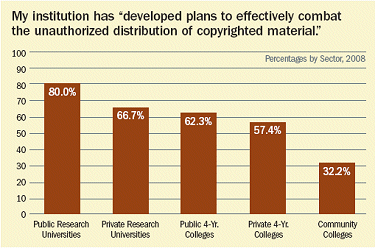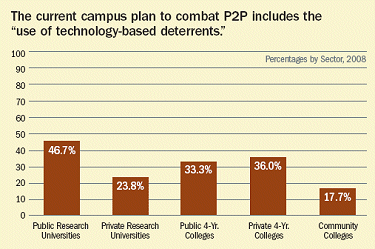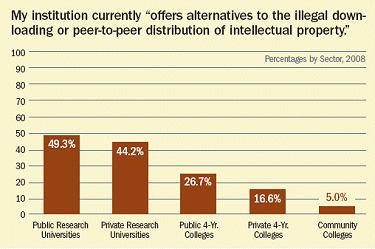In the Wake of HEA
New P2P mandates may leave your institution less than compliant.
CT asked The Campus Computing Project founder Casey Green about the impact of the reauthorization of the Higher Education Act (HEA), signed by President Bush on August 14 as the Higher Education Opportunity Act of 2008. Published reports indicate the legislation imposes literally "hundreds of new reporting requirements" that govern the activities of the nation's 4,400 degree-granting higher ed institutions. Green notes that buried deep in the legislation, in Section 488, are three regulations intended to force institutions to address the issue of illegal peer-to-peer (P2P) filesharing of digital content-- primarily music and movies. The following data and analysis from the 2008 Campus Computing Survey (a survey of 531 US colleges and universities conducted in September and October 2008) provide insight about the current level of compliance with the new P2P mandates.
Got a P2P Plan?
Do you have a plan to combat illegal P2P distribution on campus networks? Under HEA, institutions must certify to the Secretary of Education that they do. The Secretary is not required, however, to collect these plans and has no authority to review or authorize them. Data from the survey reveal that the number of campuses with plans varies widely (highest in universities; lowest in community colleges). Almost all colleges and universities are now required to develop plans.

Tech-Based Deterrence
Do your plans include technology-based deterrents? Congressman Bart Gordon (D-TN), chairman of the House Committee on Science and Technology, has stated that "technology will be the first line of defense" against illegal P2P activity. The Campus Computing Survey reveals a wide range of "technology deterrents" deployed to stem illegal P2P activity on campuses. And Campus Computing's summer 2008 survey of 321 US higher ed institutions, The Campus Costs of P2P Compliance, reports "compliance expenditures" totaling more than $500,000, including the costs of special hardware and software, plus personnel time.

Offering Alternatives
Do you plan to offer alternatives such as music services on campus? Although HEA mandates that campuses provide "alternatives" to illegal P2P activity, the Campus Computing Survey indicates that few institutions do. Many campus officials feel it is inappropriate to spend institutional funds to license online music and movie services for their students. Campus Computing's P2P compliance study found that among the small number of campuses with a license for alternative services, most were using free services such as Ruckus Network.

Source: The Campus Computing Project, 2008